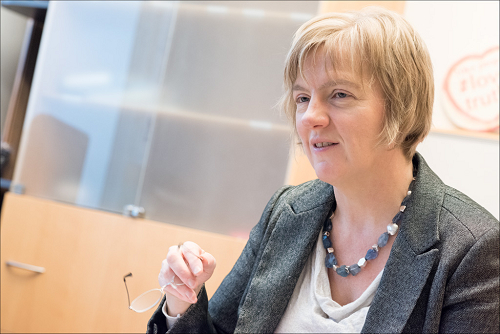Linda McAvan: "The European Parliament can and should make a big contribution to the global future of development policy"
On 8 December the development committee holds its first exchange of views with the new commissioner for international cooperation and development Neven Mimica. As the European Year of Development 2015 approaches committee chair Linda McAvan, a UK member of the Socialists and Democrats, spoke to us about the significance of the Year and the threat that Ebola poses to development.

Linda McAvan
How can the EU and the European Parliament best meet future development challenges? Is there a need to rethink our strategy?
The EU and the European Parliament can and should make a big contribution to the global future of development policy. In 2015 the UN will agree a new global development framework for sustainable development goals after 2015. The EU has a lot to contribute in terms of both financial resources but also in policies and expertise learned from our experience. This includes the development of health, water and sanitation systems and state administrations, and through the transfer of skills and technology. The strategy, as called for in the European Parliament's report on the global development framework, should put emphasis on a human-rights based approach, good governance and reducing inequalities and empowering women and girls. The European Parliament can influence the agenda of the EU's development policy more broadly by intervening on the key issues, with clear positions at the right time. We can also continue to analyse and monitor how EU development funds are spent to ensure that they are effective and targeted at those most in need.
What is the importance of the European Year of Development? What do you hope the year will achieve?
The European Year for Development is an important chance to engage citizens in the work of the EU institutions in development policy. The Parliament played a key role in creating the Year, and so it is vital that we actively engage throughout 2015 across our whole European Union. Our planned activities will ensure we work in cooperation with national European Parliament offices, the European Commission, civil society and other stakeholders to ensure it is visible as widely as possible. I hope the Year will help engage citizens beyond those usually active in the field in what the EU and its countries can do in development policy, and give a sense that the world's common problems require coordinated solutions.
How big a setback will the Ebola epidemic be to the region's growth prospects?
It appears that the effect of the epidemic will be profound and long-lasting but the response can do a lot to ensure that these economies and societies can recover the best they can. Back in September, we were hearing from agencies on the ground that this lack of coordination was seriously hindering the urgent efforts to contain the virus and stop its spread. Now that humanitarian aid commissioner Christos Stylianides has been made the EU’s Ebola coordinator, results already are being seen in the three key areas of personnel, medical equipment and safe passage in and out of the affected region, although the challenge is still huge. This is why the development committee will produce a report on lessons to be learned from the current Ebola outbreak and make longer-term recommendations on the strengthening of health care systems in the region. I hope this will be an important contribution and feed in to the efforts of the EU, UN agencies, the African Union and actors on the ground that will be part of the recovery.
Source: European Parliament
- 266 reads
Human Rights
Fostering a More Humane World: The 28th Eurasian Economic Summi

Conscience, Hope, and Action: Keys to Global Peace and Sustainability

Ringing FOWPAL’s Peace Bell for the World:Nobel Peace Prize Laureates’ Visions and Actions

Protecting the World’s Cultural Diversity for a Sustainable Future

Puppet Show I International Friendship Day 2020

